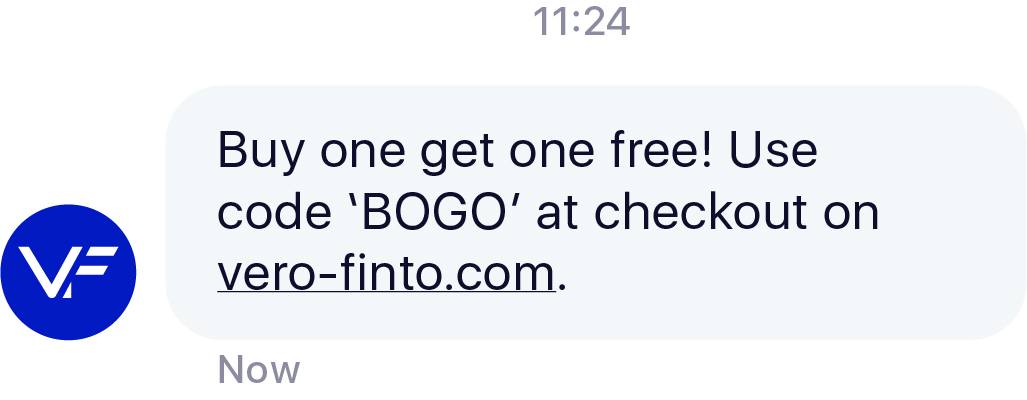Messaging - Send text-only message with Viber
NOTE:
To add this product to your account, contact a Telesign expert. This product is available for full-service accounts only.
This page walks you step-by-step through how to use Telesign Messaging to send a simple text-only Viber message to an end user.
Before you begin
Make sure you have the following before you start:
- Transaction Callback Service: You need to have this set up so Telesign can send you delivery status updates for your Messaging requests. See Messaging - Callback service for more details.
- Viber account details: To send a message using Viber, you first need to provide the details specified on the Set up Viber for your account page to our Customer Support Team.
NOTE:
The Transaction Callback Service is also where you would receive inbound replies from the recipient of your message.
CAUTION:
If an end user does not have Viber, the Viber send will fail. We recommend either ensuring your end users have Viber on their devices or including a fallback channel for users without Viber.
Steps
- Send a
POST /v1/omnichannelrequest. Include the following param values:
| Parameter | Value | Description | Required? |
|---|---|---|---|
channels | Array of channel objects | Add channel objects to the array in the order you want the service to try the channels. | yes |
channels[0] | {"channel":"viber"} | Include viber as the first channel. | yes |
channels[0].fallback_time | A time in seconds. | Specify the time to wait before cascading to the next channel. | no |
channels[1] | {"channel":"sms"} | Include sms as the backup channel. | yes (if SMS is used for backup) |
message.viber.template | text | Specify the predefined template that includes just text. To send as part of a session, use text_session instead. | yes |
message.viber.parameters.text | Some text. | Text to display in the message. | yes |
message.viber.parameters.reply_id | A unique identifier. | A unique identifier to be included in the end user's replies. This enables you to match the replies back to this request. This is only needed for two-way messaging (including session messaging). | no |
message.sms.template | text | Specify SMS as your preferred backup channel, using the text template. You can use a different backup channel and template if you prefer. | no |
message.sms.parameters.text | Some text. | Text to display in the message. | yes (if text template is used for backup) |
Request example
POST /v1/omnichannel HTTP/1.1
Content-Type: application/json
Authorization: Basic 12345678-9ABC-DEF0-1234-56789ABCDEF0:vjE/ZDfPvDkuGNsuqCFFO4neYIs=
Host: rest-ww.telesign.com
{
"channels": [
{
"channel": "viber",
"fallback_time": 600
},
{
"channel": "sms"
}
],
"phone_number": "15558675309",
"message": {
"viber": {
"template": "text",
"parameters": {
"text": "Buy one get one free! Use code 'BOGO' at checkout on vero-finto.com",
"reply_id": "100035"
}
},
"sms": {
"template": "text",
"parameters": {
"text": "Buy one get one free! Use code 'BOGO' at checkout on verto-finto.com"
}
}
},
"message_type": "ARN"
}
- If the request is processed successfully, you should see a response with a
3001status code.
Response example
HTTP/1.1 200 OK
Server: nginx/1.17.7
Date: Wed, 14 Oct 2020 21:25:54 GMT
Content-Type: application/json
Content-Length: 137
Connection: keep-alive
Allow: GET,POST,HEAD
{
"status": {
"code": 3001,
"description": "Message in progress"
},
"reference_id": "35C8B5D509BC10689196FED2AD551B8A",
"external_id": null
}
- If the send in Viber format is successful, your end user receives a message on their device that looks like this.

- If the send in Viber format fails, the service tries to send the next specified backup channel (if any).

- Updates on the status of this message are sent to the callback URL for your Transaction Callback Service. The general callback schema common to both this and other products is described on Transaction Callback Service. Modifications to the callback schema for this product are described on Messaging - Callback service. Search for these callbacks based on the reference ID in the response to your original Messaging request. Each callback payload includes an object with the status of the send for each channel that is tried.
Callback example
GET /callback_endpoint HTTP/1.1
Host: your-callback-url.com
{
"reference_id": "35C8B5D509BC10689196FED2AD551B8A",
"external_id": "null",
"status": {
"code": 3000,
"description": "Delivered",
"last_channel": "sms",
"updated_on": "2020-05-04 22:07:01:226"
},
"channel_status": [
{"viber": {
"code": 3056,
"description": "Message failed to deliver in specified fallback time",
"reference_id": "65C77D4A6C5C09085694EFB6C554D2BF",
"updated_on": "2020-05-04 22:06:03.837"
}},
{"sms": {
"code": 3000,
"description": "Delivered",
"reference_id": "65C77D4A6C5C09085694EFB6C558B4C7",
"updated_on": "2020-05-04 22:07:01:226"
}}
]
}
NOTE:
In addition to the reference ID for the Messaging transaction itself, the delivery status payload also includes a reference ID for the message-send on each channel. These can be useful for troubleshooting purposes.
Updated about 1 year ago